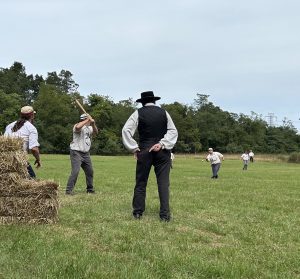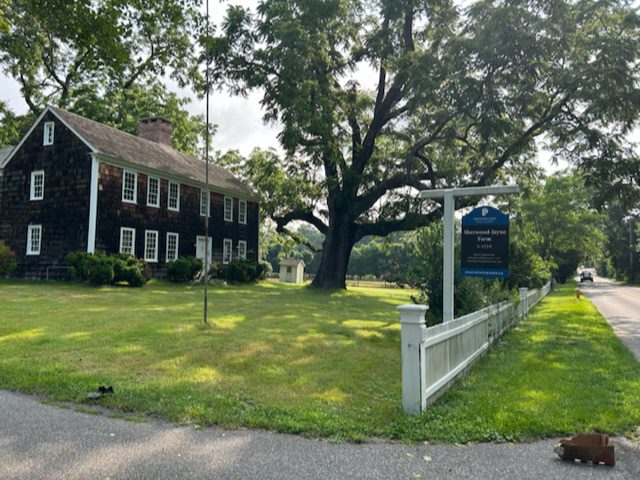A Three Village Civic Association Meet the Candidates event Monday, Oct. 2, hosted nine hopefuls (with one absentee) for local government positions — namely Suffolk County executive, Brookhaven Town supervisor, Brookhaven supervisor of highways, county legislator and town council — asking them questions through moderator Herb Mones relevant to current issues in the community.
Brookhaven Town Council: 1st District
Incumbent Councilmember Jonathan Kornreich (D-Stony Brook) is facing special education teacher Gary Bodenburg (R) in his bid to keep the seat he won in a special election in March 2021.
Kornreich, who previously served on the Three Village school board and as civic president, said he has a deep understanding of the main issues facing Brookhaven today — land use and planning, including an undersupply of affordable housing and an oversupply of vacant retail and commercial properties.
“One of my most important goals is to help guide the redevelopment of those properties in a way that doesn’t tax our already overburdened infrastructure,” he said, referring to the current system of dealing with sewage primarily through cesspools and its impact on the town’s sole drinking water source, as well as traffic.
Bodenburg acknowledged land use is a major function of the town, but added that assuring quality of life is equally important, pointing to how the many expenses of living on Long Island are straining for families.
“Sometimes we need an outsider, somebody with a fresh set of eyes to look at the issues that we face and create solutions that are somewhat creative, but are keeping our main focus of our families and our children in mind,” he said.
Both candidates said they wanted to ensure community members have the same level of access to government as land developers, as well as increased transparency in the process of member selection for planning and zoning boards.
Kornreich expressed particular concern about overdevelopment of areas like Three Village, as well as frustration about the current notification process of proposed zoning changes to nearby residents. He called the required notification letter “arcane” and confusing, and said he sends his own letter with a map and narrative explanation to residents explaining what is proposed for their neighborhood.
He said he’s working with the town’s legal department to require more robust and transparent communication. “That type of notification and that type of process makes a big difference,” he said.
Bodenburg promised to take on long wait times for things like permits. He said he planned to ensure different departments are sharing information and working cohesively to improve the efficiency of government services.
“We can do that very easily by surveying each department and finding out from the people that are serving our community: How can we help you? What makes your job easier? How can we make your job easier, so we can get our residents to get what they need faster,” Bodenburg said.
Brookhaven superintendent of highways
Newcomer Michael Kaplan (D) is challenging current Highway Supervisor Daniel Losquadro (R), who has served in that position for a decade.
Kaplan, a veteran who spent time in the Middle East with the U.S. Army, is trying to capitalize on his 30 years of experience with highway departments, from a laborer to a road inspector to working for the superintendent of highways in Huntington.
“The highway department should be run by someone who possesses the skill, someone who actually filled potholes, ran a street sweeper, plowed in many snowstorms, cleaned up things like Hurricane Sandy,” he said, adding that he also knows well the administrative side, and what needs improvement. “I want to get rid of pay-to-play. I want to get rid of basically politics in highways — people will be promoted with their merit and not by, per se, writing a check to their political party. That needs to end.”
Losquadro highlighted his accomplishments at the department, including conversion from analog to digital since his election 10 years ago. “We were a department that was hand-writing notes on work orders,” he said. “All my foremen now have iPads with a simple graphic user interface. They’re able to take photos, they’re able to upload that information instantaneously.”
That digital revolution, he added, “not only allows me to track how those work orders are being done, but it gives me a measurable metric by which I can gauge the performance of my employees.”
Both candidates shared their desire to improve safety for bikers and pedestrians, but also acknowledged the challenge of retrofitting modern infrastructure into one of the oldest parts of Long Island.
Another area of agreement was the frustration of unfunded mandates from the state and county — particularly for road and sidewalk maintenance. “I don’t know why the Department of Transportation even bothers to call themselves the state Department of Transportation anymore, because they seem to want to abdicate the responsibility for state roads almost entirely,” Losquadro said, adding that repairing sidewalks along state roads that were installed by the state has not traditionally been part of the town’s budget, and he would like to push back and request funding from the state for this work.
Kaplan suggested a more forceful response. “You need a more fierce attitude dealing with Suffolk DOT and state DOT,” he said. “I think we need fresh eyes — someone that’s really going to go up against the state government and the county government and say, ‘No, we’re not doing this anymore, and if you want us to do it, give us some money for it.”
Suffolk County executive
Town of Brookhaven Supervisor Ed Romaine (R) has thrown his hat in the ring to lead Suffolk County after 11 years at the helm of the town. He said he’s proud of his accomplishments in Brookhaven and hopes to make the same kind of changes at the county level.
“When I came into Brookhaven, we had a lot of financial trouble and we had a divided board that was very argumentative — that ended within a few months,” he said. “My colleagues on the board right up to the present day will tell you, we work together. We have unity on the board. We have a focus to go forward.”
He said he also helped repair the town’s financial distress, pointing to the fact that the town currently has a AAA credit rating, and the New York State Comptroller’s Office just gave the town a perfect “0” score for fiscal and environmental stress indicators. He said he would also work to invite wind energy into the area, noting he’d like to move the county away from fossil fuels.
Challenging Romaine, businessman Dave Calone (D) is a Three Village resident and former federal prosecutor who sought accountability for international economic crimes, particularly in oil and gas, and for terrorism after the September 11 terrorist attacks. He later participated in assisting start-ups on Long Island and around the country.
He said he is passionate about protecting the environment and, while serving as chair of the Suffolk County Planning Commission, helped streamline and expedite the permitting process for residential solar panels, something that became a model for other counties and states. He said he even spoke at a conference on the topic in Chicago.
“I think I’m the only person ever who has gone from Long Island to somewhere else to teach them how to cut red tape,” he said.
Calone also pledged to reintroduce a bill that would allow residents to vote on whether to raise sales tax by 1/8 of a cent to establish a water quality protection fund, which would help add sewers and update septic systems, in light of a summer that saw several days of beach closings due to poor water quality.
Marine scientists and other water experts have said prolific outdated cesspool systems in Suffolk are harming area waterways and the aquifer. The county Legislature blocked a referendum on the wastewater fund in July.
“For me, it’s about focusing on safety, opportunity, affordability and, obviously, environmental protection,” Calone said.
Both candidates agreed the county has significant areas to improve, especially in cybersecurity as well as in increased staffing for Child Protective Services, 911 operations and the police. Both blamed traffic fatalities on insufficient enforcement.
Calone said he would seek funding to create more “complete streets,” that is, roads friendly and safe for multiple uses: pedestrians, bikers and motorists.
Romaine called out the current county executive, Steve Bellone (D), saying there are essential positions left “deliberately” vacant, leaving police officers, 911 operators and CPS caseworkers overloaded and unable to keep up with demand for services.
“I’m supervisor of a town,” Romaine said. “If I put a job in the budget, it gets filled. If it becomes vacant, it gets filled. That is not true in the county of Suffolk,” calling the practice dishonest. “If we fill those jobs, it’s not that you’d have to pay more because you’re already getting taxed for that.”
County legislator: 5th District
Anthony Figliola (R-East Setauket), a Three Village resident with experience in economic development and government relations, and former New York State Assemblyman Steve Englebright (D-Setauket) are vying to replace the vacant seat left by Kara Hahn (D-Setauket), who would have been term limited in any event.
A geologist by trade with a long association with Stony Brook University, Englebright served in the Suffolk County Legislature from 1983 to 1992, before his long term in the state Assembly until the end of 2022. He said he was particularly inspired to reenter the county’s political sphere when he heard the Legislature in July rejected the opportunity to let people vote on the clean water bill. He said the move took away a chance for public education on how aging septic infrastructure affects the county’s sole-source aquifer and local harbors.
“The reason I’m running for the county Legislature is the work that I began there to protect clean water and protect us environmentally, and in order to encourage the growth of renewable energy — those issues are still very, very much in need, I believe, of some of the attention that I can give to them,” he said. “Let the people vote for clean water.”
Figliola, who indicated he was also disappointed the Legislature did not allow the clean water referendum, said he wants to bring to Suffolk his experience helping small businesses grow and assisting municipalities seeking federal funds for infrastructure.
“I care about this community, which is why I want to bring a private-sector mindset to the county Legislature because we have fiscal problems,” Figliola said. He also said he’d like to help small businesses succeed in order to decrease the number of vacant storefronts in the area.
Both candidates agreed red-light cameras should be used in a more thoughtful and disciplined way — for public safety and not as a revenue stream. “People feel that it is a cash grab, and I want to make sure their pockets are not being picked,” Figliola said.
Brookhaven Town supervisor
In the race to replace Romaine as town supervisor, Lillian Clayman (D), a SUNY Old Westbury adjunct professor and former mayor of Hamden, Connecticut, is facing off against Brookhaven Deputy Supervisor Dan Panico (R-Manorville).
Clayman, who also worked as an organizer for a health care union and chair of the Brookhaven Town Democratic Committee, was unable to make the event, but said previously her priorities include bringing “good government” to Brookhaven, and solving issues of waste management in light of the planned closure of Brookhaven’s landfill.
At the event, Panico detailed his long service in public office, including 13 years at his current post as councilman for the 6th District. He said Brookhaven is “light-years” from the “sordid history that unfolded from decades ago,” thanks in part to anti-nepotism and ethics laws he was part of passing.
He said a key to his collaborative style is to represent all constituents and work collaboratively with others, no matter their political leaning. He also does not talk about national politics.
“I find it to be extremely divisive,” he said. “A lot of times when elected officials are so willing to jump into the fray of national politics and culture wars, it’s because they’re not necessarily spending that time that they should be doing the job they were elected to do.”
Panico pledged to do his best to protect open spaces from overdevelopment, an issue of particular interest to area residents, and something he has had success doing. “Land use zoning and planning is my expertise,” he said, adding that the area where he grew up — Mastic Beach — was a victim of “haphazard” development, which is difficult and expensive to redevelop. He said he would like to avoid that issue in places with historical properties and such a sense of place. “You have something special here in the Three Village area,” he said.
He also said he would address issues of illegal student housing in local neighborhoods by working with Stony Brook University to find solutions — especially in light of record donations to the school that could enable additional appropriate student housing. He said he has experience in cracking down on illegal housing situations and pledged to do the same in the Three Village area. “It’s like cancer,” he said. “If you, as a government representative, do not address the issue, and the people don’t believe their government is listening and doing something, what happens? The ‘for sale’ sign goes up, especially in this market, and it spreads down the block.”
Election Day is Tuesday, Nov. 7.





















